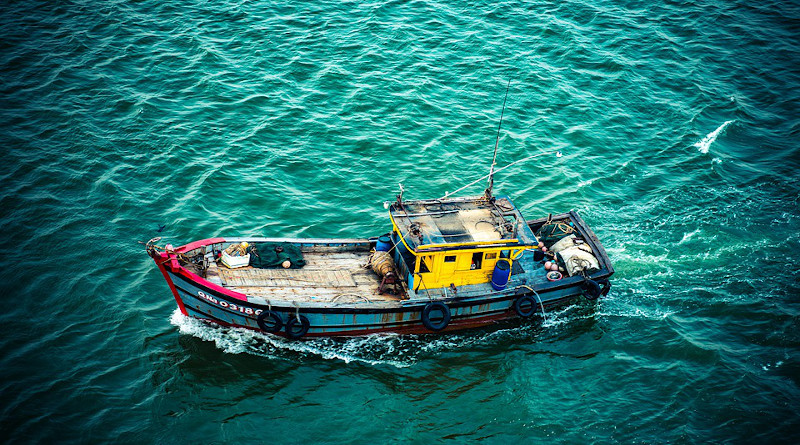Vietnam Encourages Fishermen To Defy China Ban In South China Sea
By BenarNews
Vietnam’s government on Tuesday encouraged the nation’s fishermen to keep operating around the disputed Paracel Islands, despite China’s unilaterally imposed fishing ban in the South China Sea, and directed provincial authorities to support Vietnamese fishermen at sea.
That statement of defiance from Hanoi, calling the ban “invalid,” came as an oil exploration ship contracted by another South China Sea claimant, Malaysia, ended a survey farther south, off the Malaysian coast. The ship has been shadowed by Chinese ships for the past month.
The two developments highlighted the differing approaches of Vietnam and Malaysia in handling their maritime disputes with China. Beijing has been pressuring both nations as it looks to assert to sweeping claims over contested islands and ocean.
Vietnam’s Ministry of Agriculture and Rural Development directed provinces and cities to encourage fishermen to continue with their activities within Vietnam’s territorial waters.
It told local authorities to “strengthen the management and supervision of fishing activities” and monitor departures during the period of the ban, according to Vietnamese news outlet VNExpress. The ministry also directed provincial authorities to support fishermen at sea and said an emergency hotline would be set up with the Department of Fisheries Control.
Satellite imagery on Tuesday showed Vietnamese fishing boats continuing to operate in the area covered by the fishing ban.
China announced its annual summer fishing ban on May 1, outlawing all fishing activity in an area north of the 12th parallel of the South China Sea that it claims to have jurisdiction over. Fisheries associations from Vietnam and the Philippines immediately protested China’s ban.
Last week, Vietnam’s Foreign Ministry also rebuked China over the measure.
China responded Monday, saying it has “sovereign rights and jurisdiction over relevant waters” in the South China Sea. It contended that the fishing ban was lawful, even over areas in dispute.
“Vietnam has no right to make unwarranted accusations against China, not to mention encouraging its fishermen to infringe upon China’s rights and interests and undermining the sustainable development of fishery resources in the South China Sea,” Foreign Ministry spokeswoman Zhao Lijian said at a news briefing.
Despite China’s claim that the ban is about environmental sustainability, satellite imagery and ship-tracking software indicates a large Chinese fishing fleet south of the 12th parallel. That’s in an area not covered by the fishing ban.
The area is also claimed by Vietnam, Taiwan, the Philippines and Malaysia.
Among the claimants in the South China Sea, China and Vietnam probably have the most visible rivalry, notwithstanding a measure of fraternal relations between their respective ruling parties.
In early April, a Vietnamese fishing boat sank during a confrontation with a Chinese Coast Guard (CCG) ship near the Paracels, prompting a strong protest from Hanoi and stiff criticism from the United States, which accused China of exploiting the COVID-19 pandemic to expand its “unlawful claims” in the South China Sea.
China claims that the Vietnamese boat sank itself after ramming a CCG ship.
Farther south, Malaysia has taken a lower-key approach to its own slow-burning, standoff-at-sea with China.
The West Capella, a drillship contracted by Malaysian state-owned oil company Petronas, has been operating in Malaysian waters for five months. Since April 15, a Chinese survey ship, Hai Yang Di Zhi 8, with CCG and maritime militia escort ships has been in the same area, conducting its own survey within Malaysia’s exclusive economic zone.
That’s been widely viewed as an attempt to pressure Malaysia to stop oil exploration in waters China claims. It prompted the U.S. and Australia to conduct naval exercises in that area, although no confrontation ensued.
On Tuesday, Seadrill, the company that operates the West Capella, said the drillship was leaving the region. “The West Capella has finished its planned work and has left the area,” Ian Cracknell, the company’s communications director, said by e-mail.
The Washington-based Asia Maritime Transparency Initiative had previously reported that the West Capella drillship was contracted by Petronas to search for resources until May 20.
The Malaysian government has yet to comment about the departure of the West Capella. On April 22, Malaysian Foreign Minister Hishammuddin Hussein said that he was consulting privately with both the U.S. and China, and urged all parties to refrain from sending more warships and coast guard ships to the area, as it “may affect peace, security and stability in the region.”
Ship-tracking software showed that as of Tuesday, the Chinese ship Hai Yang Di Zhi 8 and its escorts remained in place, continuing its survey activities as the West Capella was ending its mission.

